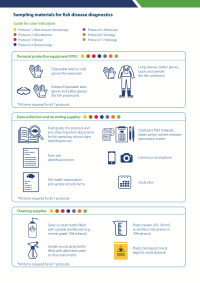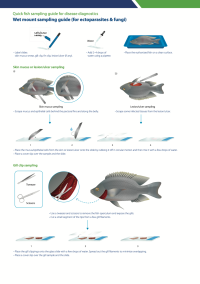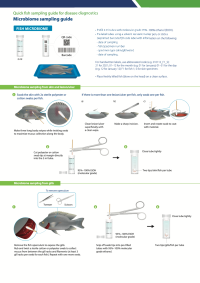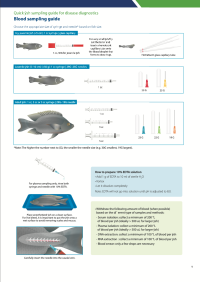Infectious diseases represent one of the major challenges and limitation to sustainable aquaculture. They can have major impacts on animal welfare, livelihood of farmers and threaten the health of captive stocks and wild populations. Pathogens can spread through movement of live fish, fish products, water and shared equipment. Routine screenings of pathogens in aquatic animal production systems are important to minimize the risk of their introduction, transmission and spread. On suspicion of a disease during abnormal mortalities, investigation with collection of biological samples from moribund animals must take place rapidly for disease diagnostics. Quality biological sampling is a fundamental requirement for all kinds of disease diagnostic and pathogen screening work. WorldFish and partners developed this rapid guide on sampling materials required for fish disease diagnostics. It lists all the personal protective equipment, the data collection/recording/cleaning supplies and sampling materials: consumables, reagents, media and tools needed to conduct one of the six quick fish sampling guides for disease diagnostics: 1. Wet-mount sampling guide (for ectoparasites & fungi) 2. Fish & water Microbiome sampling guide 3. Blood sampling guide 4. Bacteriology sampling guide 5. Molecular and virology sampling guide 6. Histology sampling guide.
A free online course on foundations in fish disease sampling is also available via Learn.ink.
Parasitic and fungal infestations represent one of the major challenges to sustainable aquaculture. As part of routine health checks or during abnormal mortality events, screening for ectoparasites and fungi in tilapia, carp and catfish production systems is important to minimize the risk of their introduction, transmission and spread. WorldFish and partners developed this quick guide for ectoparasites and fungi assessment under a light compound microscope. Standard wet-mount specimens consist of gill biopsy (gill clip), fin biopsy (fin clip) and skin scraping (mucus smears). Additional smears may be included in the presence of external lesions/ulcers (eye, skin, mouth). A free online training course on wet mount sampling is also available via Learn.ink.
Interactions between microbes associated with the host, other organisms present in the system and the environment itself are increasingly recognised to contribute to aquatic animal diseases. Those microbiome assemblages and their functions are extremely diverse and poorly understood. They vary over time in water and between host tissues and organs.
High-throughput sequencing technologies (multi-omics) and bioinformatics analysis of complex microbiomes can provide biological insights offering new opportunities for early detection of pathogens and disease mitigation strategies. Similarly, such approaches are being applied to study the effect of locally available ingredients for use in fish feeds and their impact on fist gut microbiome and the health of the pond environment—optimising the growing conditions on-farm.
WorldFish and partners developed this quick guide for microbiome sampling from fish skin/gills mucus swabs, internal organs (e.g. gut) and water samples from ponds, hatcheries tanks, river, and canals.
A free online training course on microbiome sampling is also available on Learn.ink.
Fish blood sampling requires specific techniques and skills that are fundamental for all kinds of analyses such as haematology, chemistry analysis, parasitology/bacteriology investigation, antibody titration, molecular diagnostic and many others. WorldFish and partners developed this quick guide on blood sampling from fish for: (1) blood serum isolation, (2) blood plasma isolation, (3) blood DNA extraction, (4) blood RNA extraction, or for (4) blood smear preparation on microscope slide. A free online course on blood sampling is also available via Learn.ink.
With the implementation of the new aquatic animal disease reporting in the Asia Pacific region from January 2021, and in lieu of the published QAAD Reports (last issue published was 4th quarter of 2020), NACA is publishing reported aquatic animal diseases submitted by countries in the Asia-Pacific region. This report covers the third quarter of 2023 and the original and updated reports can be accessed from the QAAD page.



